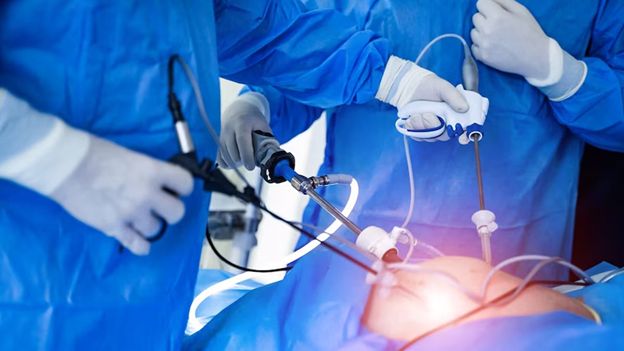Science
Robotic Surgery Transforms Prostate Cancer Treatment in India

Prostate cancer remains a significant health issue for men in India, with millions of new cases diagnosed annually. The introduction of advanced robotic surgery presents a transformative opportunity for improved treatment outcomes. This innovative technology enhances surgical precision, reduces recovery time, and minimizes complications, offering new hope in the battle against this disease.
Advancements in Surgical Techniques
Traditionally, the primary treatment for prostate cancer involved open radical prostatectomy, which required a large incision. This approach often led to considerable pain, significant blood loss, and longer recovery periods. Additionally, it carried risks of complications such as erectile dysfunction and urinary incontinence, issues that many patients dread.
The advent of laparoscopic surgery represented a step forward, offering a less invasive alternative. However, it still posed challenges for surgeons in terms of dexterity and range of motion. The implementation of robotic-assisted prostatectomy has now revolutionized this field. Contrary to popular belief, the robotic system does not perform surgery independently. Instead, the surgeon operates from a console, controlling highly advanced robotic arms with exceptional accuracy.
These robotic arms replicate the natural movements of a surgeon’s hand, providing enhanced flexibility and stability. They filter out even the smallest tremors, which can be crucial in delicate procedures. Furthermore, the robotic system offers a magnified, three-dimensional view of the surgical area, significantly improving clarity compared to traditional methods.
Benefits for Patients
The impact of robotic prostate surgery on patient outcomes is substantial. Smaller incisions lead to reduced pain and blood loss. Moreover, the precision of robotic techniques allows for the careful preservation of the sensitive tissues and nerves surrounding the prostate gland. This has resulted in better long-term outcomes, significantly lowering the risk of urinary incontinence and erectile dysfunction, the two most feared complications of traditional radical prostatectomy.
Dr. Gaurav Garg, Senior Consultant in Urology/Andrology at Max Smart Super Speciality Hospital, emphasizes that the shift to robotic surgery represents a paradigm change in prostate cancer care. He notes that the technology enhances the surgeon’s ability to execute complex procedures with greater confidence and accuracy.
The integration of robotic surgery into prostate cancer treatment exemplifies how modern medical technology can dramatically improve patient care. As healthcare systems around the world face increasing demands, innovations like these are vital in providing effective solutions for complex health issues.
By embracing advanced techniques such as robotic surgery, healthcare providers can offer a new standard of care that not only addresses the immediate concerns of prostate cancer treatment but also enhances overall patient well-being. The future of prostate cancer treatment in India looks promising, with technology paving the way for improved outcomes in the fight against this prevalent disease.
-

 World4 months ago
World4 months agoSBI Announces QIP Floor Price at ₹811.05 Per Share
-

 Lifestyle4 months ago
Lifestyle4 months agoCept Unveils ₹3.1 Crore Urban Mobility Plan for Sustainable Growth
-

 Science3 months ago
Science3 months agoNew Blood Group Discovered in South Indian Woman at Rotary Centre
-

 World4 months ago
World4 months agoTorrential Rains Cause Flash Flooding in New York and New Jersey
-

 Sports3 months ago
Sports3 months agoBroad Advocates for Bowling Change Ahead of Final Test Against India
-

 Top Stories4 months ago
Top Stories4 months agoKonkani Cultural Organisation to Host Pearl Jubilee in Abu Dhabi
-

 Science4 months ago
Science4 months agoNothing Headphone 1 Review: A Bold Contender in Audio Design
-

 Top Stories4 months ago
Top Stories4 months agoAir India Crash Investigation Highlights Boeing Fuel Switch Concerns
-

 Sports3 months ago
Sports3 months agoCristian Totti Retires at 19: Pressure of Fame Takes Toll
-

 Business4 months ago
Business4 months agoIndian Stock Market Rebounds: Sensex and Nifty Rise After Four-Day Decline
-

 Politics4 months ago
Politics4 months agoAbandoned Doberman Finds New Home After Journey to Prague
-

 Top Stories4 months ago
Top Stories4 months agoPatna Bank Manager Abhishek Varun Found Dead in Well









